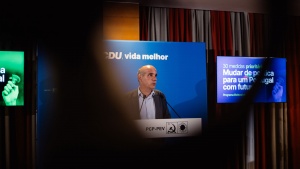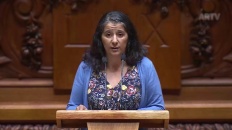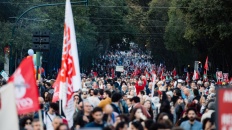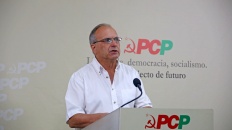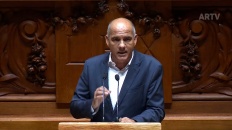On last January 25, the PCP presented its electoral programme. A programme that is a commitment to the workers and the People where we identify problems, point out causes, signal objectives, guidelines and measures to respond to them.
A programme that shows that there are solutions to the main national problems, that there are resources and means to implement them if that is the direction of the political options.
As we stated then, the country needs a patriotic and left-wing policy, it needs solutions for a Portugal with a future.
We can no longer bear the contrast between the profits of economic groups and multinationals, and low wages and pensions.
We can no longer tolerate the sacrifice of public services and the well-being of the population, in the name of EU impositions.
We can no longer tolerate the non-implementation of the right to housing, daycare and a doctor.
We can no longer tolerate the economic and political crime that is the handing over of strategic companies to foreign capital and the worsening of external dependence.
We start from this reality to propose a different programme for a different policy that stands up to the interests of big capital, that responds to the problems of the workers and people.
Anyone who says they will respond to the most pressing problems without facing the power of economic groups is selling a pig in a poke.
Without this rupture, without this courage and determination, we cannot respond to what needs to be responded to.
The country has resources that are increasing the profits of economic groups and being consumed by EU impositions. Resources and means that must be put at the service of the country's development and the improvement of the people's living conditions.
Last year alone, between the budget surplus and the – always questionable – limit of 3% public accounts deficit on GDP, around 11 billion euros remained unused.
When what was required was to strengthen public investment, public services, wages, fiscal justice and stimulate economic growth, the PS chose to protect the interests of big capital and cut off peoples’ rights in order to reduce the debt.
The country has resources. Witness the profits of the economic groups that dominate energy, telecommunications and large retail. The profits of banks, which point that the 5 largest national banks will have more than 4 billion euros in profits in 2023. The profits of multinationals operating in Portugal. The profits of investment funds that speculate in real estate, industry, the financial sector. Profits that did not fall from the sky, profits built on low wages, tax favours and privileges, public resources that are captured, the big deals of privatisation.
The country has resources and has the real and urgent possibility of increasing wages.
What is needed is to make options.
The option of replacing imports with national production, of managing public accounts in a balanced way, of combating waste and not giving in to big interests by taxing big capital, high-value assets and luxury.
The option to bet on economic growth, instead of an accelerated debt reduction.
The country has resources to significantly improve living conditions in the country, to prepare for the future.
We do not accept inevitabilities, but point out the alternative path. Today we are presenting 30 priority measures to respond to the most pressing problems that exist, measures that can and should be expressed as early as 2024. Some of them have a budgetary impact, whether in terms of revenue or in terms of expenditure, making it clear from now on that the State Budget that is in force will need to be deeply corrected.
We reaffirm the national priority, the general increase in wages. An urgency now and not for 2028.
In 2024, no worker can receive less than a thousand euros in wages per month.
This is the time to repeal the expiry of collective bargaining and reinstate the principle of more favourable treatment for workers.
Decisive measures to boost collective bargaining and increase wages by 15%, with a minimum of 150 euros for all workers in the public and private sectors.
Distributing better the wealth created, matching increases in productivity with wages, bringing the average wage closer to that of other countries, thereby also strengthening revenues for Social Security, allowing for better pensions today and in the future, this is what is necessary and not diverge with other countries, as has been the case.
Priority must be given to organising the lives of millions of workers subject to high workloads, shift work and continuous work, precariousness and permanent instability, especially for hundreds of thousands of young people.
This is a crucial issue.
We are talking about every person's life, their health, their right to see their children grow and play with them, their right to have a life project.
These fair objectives require the reduction of working hours to 35 hours per week, the fight against deregulation of working hours and the reduction of the trial period, the legal limitation of shift work and continuous work and their compensation, require that a permanent job corresponds to a full employment contract.
They demand respect for Public Administration workers, namely by repealing the unfair evaluation system, the SIADAP.
Pensions must also increase again extraordinarily in 2024, guaranteeing a 7.5% increase, with a minimum of 70 euros and with retroactive effect to January, including for those who retired last year.
Increase in pensions in a gradual path for their valorisation, above inflation, in the course of the legislature.
We do not accept that those who have paid for 40 or more years do not see their right to retirement without penalties honoured and it is necessary to restore the retirement age to 65 years.
We will also give priority to supporting people with disabilities, namely through the improvement of the Social Benefit for Inclusion, ensuring an increase of 70 euros per month, and its payment for 14 months, and the extension of the conditions of access to this benefit for people with disabilities.
Only the NHS is in a position to guarantee everyone the right to healthcare. It is a priority to stop the departure of professionals and resources from the NHS to the disease business. This requires a profound change in the subcontracting policy to private groups, creating the conditions to significantly reduce this dependence. But what is decisive is that doctors, nurses and other professionals are attracted and retained in the NHS. We are putting forward a proposal that the PS Government rejected when discussing the 2022 Budget. We want to table an exclusive dedication regime in the NHS, which guarantees a 50% increase in pay, and a 25% increase in the length of service of these professionals. The same applies to Public Schools, where there is a shortage of thousands of teachers, ensuring in particular the counting of the full length of service and permanent employment after three years of teaching. And, in relation to the security forces, who are also victims of the PS, PSD, CDS, Chega and IL options, it is a priority to ensure a substantial increase in the amount of the risk allowance for professionals, meeting their fair claims.
We are not resigned regarding the housing problem. A social scourge that is the result of disinvestment in public housing, the favouring of the profits of banks, the liberalisation of rents and evictions, the precariousness of leases, the transformation of housing into a real estate asset. If nothing is done in the coming months, the situation will get even worse. It is necessary to launch an ambitious programme in 2024 to make public housing available, targeting 50 thousand new homes in the course of the legislature. And intervene now by applying a regime to protect homeownership, making banks bear the burden of increasing interest rates; as well as a protection regime for rented housing, with regulation and reduction in the value of leases, the repeal of the Evictions Law and stability in leases on a ten-year basis.
Regarding the right to mobility and transport, it is necessary to continue the path to which the CDU made a decisive contribution with the creation and reduction of the price of the intermodal transport pass. It is necessary to valorise public transport, which requires, in addition to expanding the offer throughout the country, a reduction in the cost of the intermodal pass to 20 euros and the creation of an interregional pass with a maximum cost of 40 euros.
Free daycare was a path imposed by the PCP and cannot be left halfway. It is a priority to create a public network of free daycare centres (integrated into the educational system) with the aim of creating 100,000 new openings by 2028. Children have a right to child benefit, therefore we will propose that its universalisation be restored and the increase of its amount.
And if children's rights need to be strengthened, the youth also need to see reflected in their lives a policy that promotes their development instead of shoving them abroad. Wages, rights, housing and other proposals already mentioned here are fundamental, and, in the case of young students, it is necessary to guarantee the end of tuition fees and the reinforcement of school social action in higher education, particularly with urgent measures for the construction, refurbishment and adaptation of public student homes.
There are conditions to achieve the goal of 1% of GDP for Culture in the next State Budget. This amount expresses a political priority that removes the suffocation of cultural and artistic bodies in our country, from the merry-go-round of candidacies to disguise the lack of responsibility of the State. Culture is needed, and it is not, cannot be a luxury for elites.
The situation in the national productive sectors, whether in industry or agriculture, requires responses that go far beyond the fiscal dimension. The periods of high inflation that have occurred in recent years and whose effects persist, highlight the need for urgent intervention by the State in regulating prices and reducing costs with fuel, electricity, communications, insurance, credit or tolls. It is necessary to intervene in what strangles the lives of micro, small and medium-sized companies. It is necessary to end the dictatorship of large retail and its negative impacts on national agriculture and food sovereignty. With bank commissions that are a robbery. With cartelised tariffs as in telecommunications. With the scandalous margins of the oil companies.
In terms of taxation, there are conditions to restore VAT to 6% on gas and electricity, and consider telecommunications, essential to everyone's daily life, as an essential service that instead of the current 23%, is taxed at 6%. An option that would mainly benefit millions of workers and pensioners, whose income is fully consumed by essential goods. In the Personal Income Tax (IRS), it is necessary to deepen its progressiveness by establishing ten brackets, with relief in the first three and updating the value of the specific deduction.
The priority is to cut taxes on labour and family consumption and increase effective taxation on big capital.
It is scandalous to see every day the PSD, CDS, Chega or IL clamouring for an even greater cut in taxes paid by capital. When we all know that it is the great profits, the great fortunes, the high-value assets that benefit most from this talk. It is a priority to ensure the elimination of current tax benefits. Nothing justifies the more than 1600 million euros that will be pocketed this year by economic groups and, given the tremendous size of the profits that were achieved in 2023, apply a special tax on profits in the banking, energy and retail sectors.
It is also a priority to begin right away a process of reversing the existing so-called Public-Private Partnerships, particularly in the highways, where more than a billion euros are consumed per year alone, but also in the railways and in the healthcare sector. All highway PPPs will end by 2035. They will only remain that way, like the drain on public resources associated with them, if someone decides to continue filling the concessionaires' pockets.
Breaking with a policy that places the State and the Country to serve the interests of a huge minority requires an absolute refusal of the privatisation policy. And at the start of the legislature, we will want to investigate the privatisation process of ANA – Aeroportos to its fullest consequences, calling for a Parliamentary Commission of Inquiry on this matter. An absolutely ruinous privatisation that is conditioning the country. For the CDU, it is a priority to go ahead with the construction of a new airport at the Alcochete Shooting Field. There is no reason to continue postponing this decision. There is no reason to subordinate the country's interests to the Vinci multinational.
There is also a need for clarity regarding TAP. After recovering from the impacts of the pandemic and capitalised, now that it is achieving positive results, TAP finds itself faced again with the threat of privatisation. Fully or partially, the right and the PS unite in the desire to complete yet another sell-out. We want to affirm that it is a priority for the country to stop the privatisation of TAP and, instead of destroying it, we need to invest in its development.
Also responding to the existing drought situation, the worsening of environmental problems, the need for an energy transition adjusted to national interests, pose important challenges. First of all, in relation to this valuable resource that is water. Urgent measures are needed, which are not being taken to face the coming summer. But more than waiting for it to rain, it is a priority for the country to defend public water, and ensure an investment programme for collection, storage, transport and efficiency in the use of water.
Measures are needed to enhance the countryside and guarantee territorial cohesion. Words are not enough, measures are needed for strong public investment in the Countryside, restoring public services that were closed, investing in public transport, eliminating tolls on the former SCUT roads, moving forward with regionalisation.
Here at the PCP and CDU we say what we are going for. We don't talk about taxes to hunt the votes of the poor and increase the profits of the rich. We do not stir up the problems of the NHS to justify giving even more public money to the disease business. We do not postpone wage increases for when hell freezes, when what is required is that here and now, we respond to the increase in the cost of living. We do not hide behind the right accounts to further deepen injustices in the distribution of wealth. We do not instrumentalise environmental concerns to paint green taxes or profits of multinationals. We do not ride corruption and then legalise influence peddling, promote privatisations, attack the democratic regime. We do not talk of peace to continue promoting war. We do not present ourselves as left-wing and then carry out right-wing policies.
In addition to the value of the solutions that these measures convey, they have the strength of the given word, dignity, trust, of those like the PCP and CDU who do not say one thing before the elections, only to do the opposite afterwards.
This set of 30 priority measures that we wanted to highlight from our Programme, constitute responses aimed at solving problems, correcting injustices, stopping mistakes that the Country cannot make, and taking advantage of possibilities that cannot be wasted.
They are part of a broader policy, a policy that is left-wing and patriotic. Which has a class dimension and a national dimension. Who is with the workers, is with the People, is with the Country.
If we asked the workers, the vast majority of the Portuguese people, I have no doubt that they would agree with the CDU in the demands set out here. Because they correspond to their wishes and aspirations, which is not unimportant. Some of them are long CDU battles that have been partially implemented. But their implementation, to become a reality in everyone's life, demands that the CDU be given more strength. You can be sure of one thing, the more strength the CDU has, the closer will be the implementation of what has been presented.
